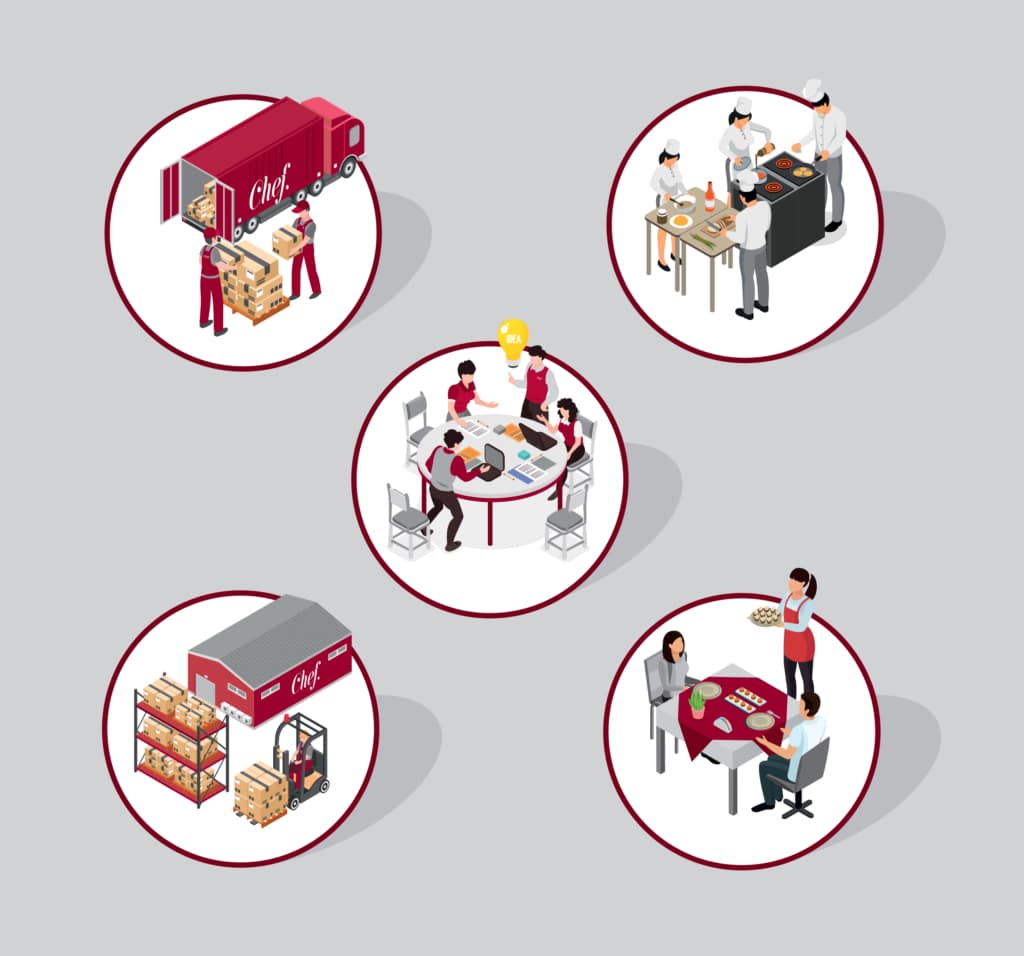
Among the foodservice and HORECA industries’ strategic partners, in this exclusive interview, Chef Middle East’s management team CEO Steve Pyle, Head of Sales & Category Georges Louis, and Head of Supply Chain & Procurement Alwin Andrews share their insights on the hospitality industry in the wake of and post-COVID-19.
How has the COVID-19 pandemic altered the foodservice industry in the region?
Pyle: This pandemic has had a huge impact on our industry. Hotels, restaurants and caterers, along with their supply chain, have been operating globally at around 20% of normal levels of business. There has been a huge human impact, too, as people have lost jobs and or suffered reduced incomes. In the supply chain, inventory expiry and market liquidity have become huge, overbearing challenges.
Andrews: With the soft reopening of fine dining restaurants and hotels, we’ve observed a gradual movement of gourmet and speciality ingredients lately. However, we believe that the product mix that we will need to source and stock in the future will be different to that from pre-COVID times.
A rise in domestic sourcing, local partnerships, building homegrown brands and concepts, and supporting food sustainability and security initiatives could be the new shift moving forward.
Developing and securing a well-defined product range that adapts to ever-changing customers’ needs and demands will be key under current circumstances.
Such worldwide crises tend to have implications on the supply chain; what was the biggest impact you’ve observed on business and what further challenges do you foresee?
Andrews: Managing the inventory effectively and collecting outstanding receivables have been two of the main points of focus, as we started navigating through the crisis. We’re using the momentum of the outbreak as an opportunity to reform our supply chain model to operate and adapt to new changes.
The closures and partial operation of many factories worldwide due to containment measures and furloughs resulted in raw material shortages and supply constraints. With many of them rebooting with new demand planning, product mixes and longer lead times, there have been further shipment delays.
Containing the pandemic with improved hygiene measures will be a challenge for food production, while further issues with harvesting and raw material unavailability threats should lead to some price increases. This will become clearer throughout Q4, but we have already seen increases in the cost of global freight forwarding. Transparency and flexibility with suppliers will be key drivers to avoid the disruption of the food supply chain.
When do you think the market will recover to pre-COVID-19 levels and how do you plan on supporting your customers in the meantime?
Louis: TheChef Middle East team anticipates that the market won’t fully recover before end of Q4 2020, to beginning of 2021. Market requirements are changing, and the distributor is committed to act as a key strategic partner for its customers and support them by providing culinary expertise and services through its team of experts and facilities: this is to help operators recover and develop their menus in the most effective way, in order to cope with current and future challenges.
The hospitality sector requires a structural rethinking that promotes efficiency, effectiveness and safety, not only for this particular period, but also for the future. Foodservice players have to be fast enough to build competitive agility to win amid new challenges, understand the needs of their customers, and innovate, which Chef Middle East offers to fully undertake.
What’s your sentiment for Q3 and Q4 2020 in regard to the F&B market in the region?
Pyle: Cautious optimism.
Louis: The hospitality industry will witness an increase in demand through Q3 and Q4 2020 versus Q2 2020. We’re already seeing month-on-month progress, as more restaurants and hotels are reopening with different operational formats and deals to attract customers. The UAE government is taking strong measures to control the COVID-19 situation, which will further boost customers’ confidence and grow this positive momentum.
Will there be a consistent shift towards delivery and away from in-restaurant dining as a result of the ‘new normal’?
Pyle: I believe it will remain a feature of how the industry operates forthwith. The consumer is driving this, but it will not replace the social experience, nor the superior food quality of a restaurant.
Louis: Food and social interactions are extremely tangled. Most people want to explore a memorable dining experience in a unique, unforgettable restaurant. The culinary and social dining experience that a restaurant offers are two crucial factors that cannot be replaced.
We’ve seen a rise in meal kit offers, what do you forecast for this segment in the coming period?
Louis: In such pressing times, where customers are looking at capturing more value from every purchase they make, this line of the offering will continue to increase. Some food operators might keep it in their menus, as this initiative has enabled them to access a new tier of customers, which they may not necessarily have had access to before.
What changes are we expecting to see on operators’ menus?
Pyle: A more pragmatic approach to menu propositions in the short-term, as changes in availability and food costs are evaluated. Ultimately, the creativity of most able restaurant operators will surface, and they will lead the regeneration of the F&B industry across the globe.
Louis: Some of our customers are still considering whether to reintroduce their old menus or not. They want to recalibrate their proposition to find the right balance between high gross profit dishes vs. less popular items. They are also looking at cross-utilising ingredients on a menu: a ‘less is more’ approach to reduce potential wastage. Some are also moving to ready-to-eat products instead of house-made to lower labour costs.
What message would you like to give your customers?
The Chef Middle East team reiterates that the company is taking all the necessary precautionary measures to ensure the safety of its employees and customers alike.
Additionally, the distributor acknowledges how important it has become to stay close to their customers and understand their fast-changing needs. The CME team would like to highlight that it’s ready to support the hospitality industry in bouncing back from this situation more robust than ever, and is currently developing new programmes aimed at delivering extended assistance to key customer segments in all the markets they operate in, to promote enhanced collaboration and provide smart solutions to current and upcoming challenges.












